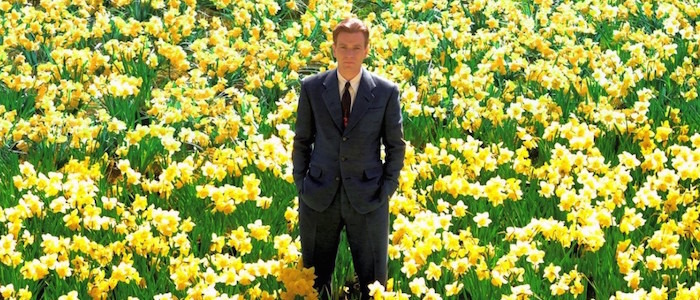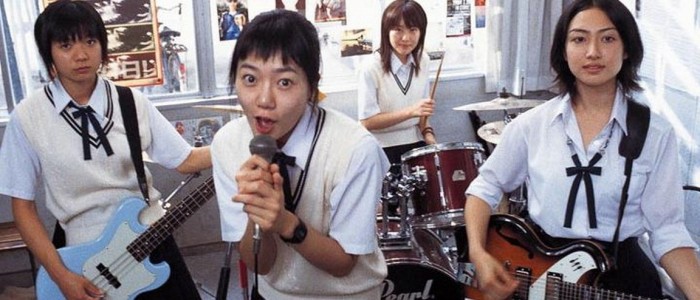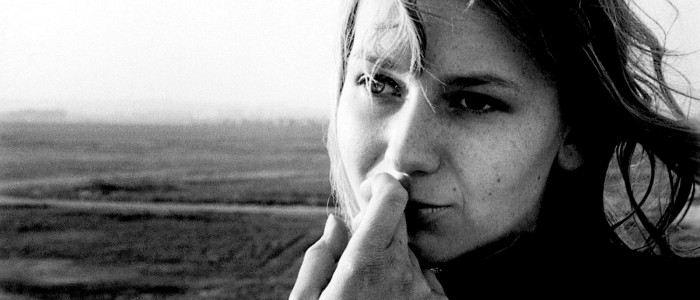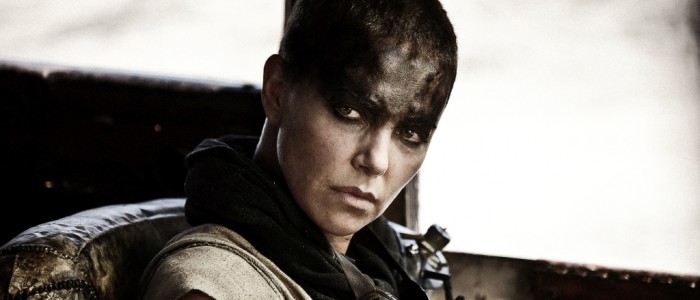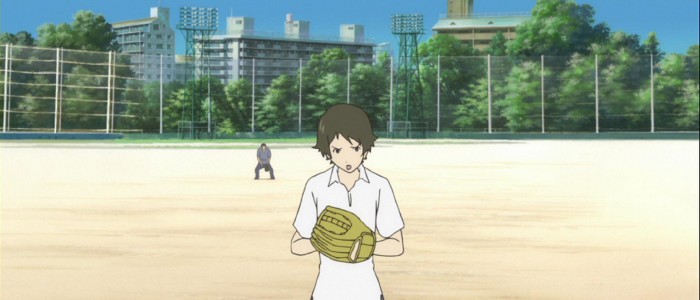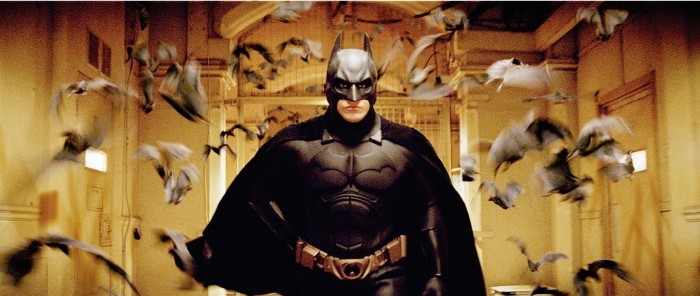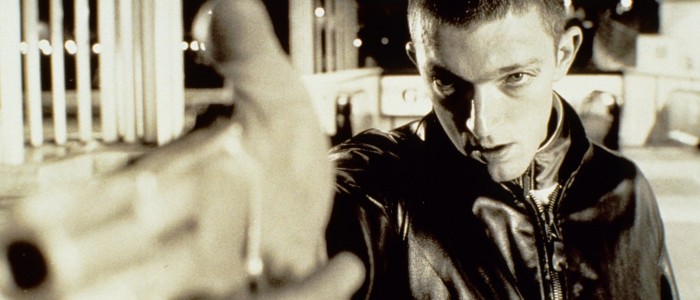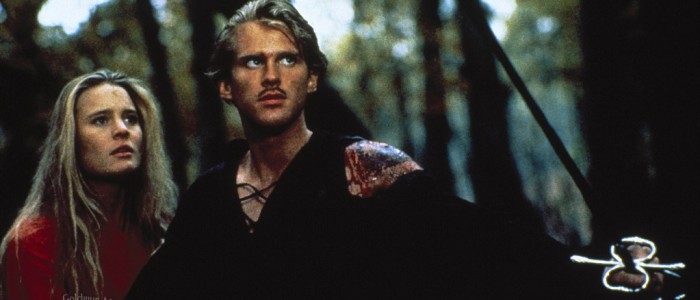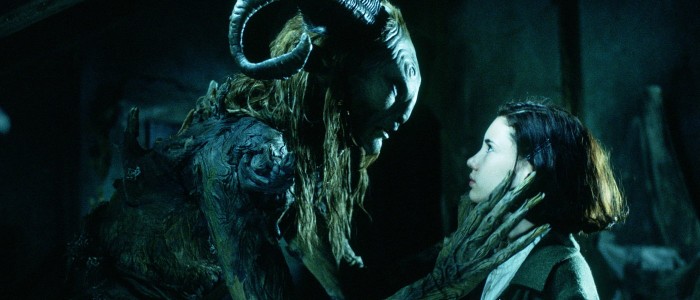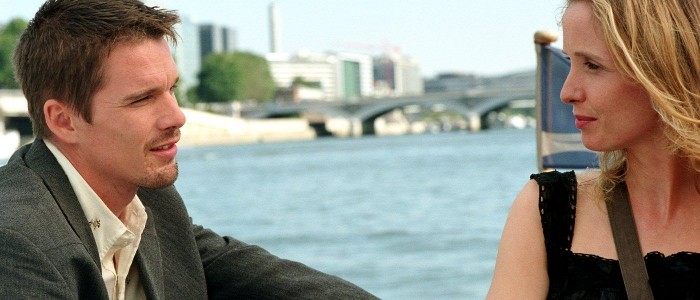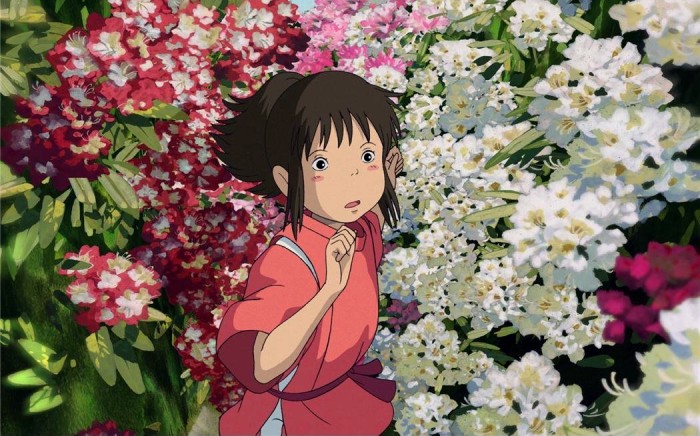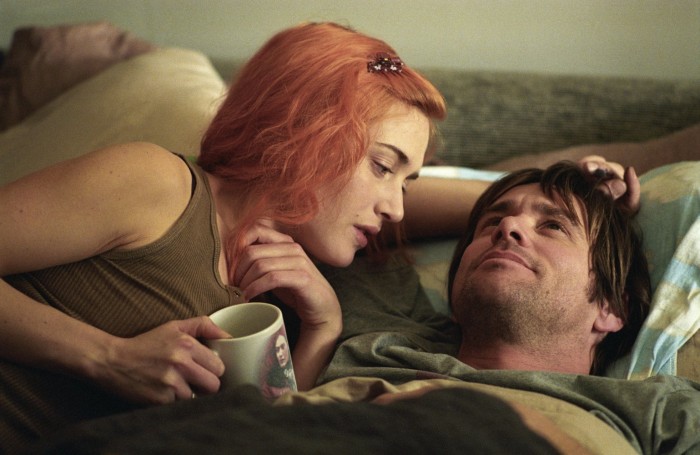Hoai-Tran Bui's Favorite Movies Of All Time
Hey, /Film. What's a nice place like you doing in a girl like this? Wait, let me start over...
My name is Hoai-Tran Bui, and I'm just happy to be here. Before you ask me how to pronounce my name (not important, and you'd probably get it wrong anyway), let me tell you about my favorite films.
I struggled more than I probably should have over this list. See, I wanted to impress you, /Film. I wanted to list films that I thought were Important (capital "I" intended), but were also Important to Me. After hours of angsting, I narrowed it down to this list of 15 movies that if you'd asked any of my friends, they'd say, "Ah, that's the most Hoai-Tran list I've ever seen." (I did ask them, and they did say that.) It's not just because there's an abundant amount of time travel movies, or surreal fairy tales or sweeping romances. It's because these movies embody, to me, the sheer wonder of cinema and all that it is capable of.
Now that we're over the awkward pleasantries, let's get to the meat of things, shall we?
A candy-colored magical realism story housed within a family drama, Big Fish is perhaps director Tim Burton at his most subdued — and his most moving. I cannot give enough credit to the influence Big Fish had on me as a budding movie lover; I was enamored by the grand fairy tale story and larger-than-life characters that were grounded by the poignant reunion of an estranged son and his sick father. While it's easy to be distracted by the film's stylish quirks, Ewan McGregor's beautiful face and Albert Finney's unreliable narrator, Big Fish is a fantastic and fantastical film.
14) Linda Linda Linda
Before I properly became a cinephile, I had a high-school obsession with Japanese dramas. This led to an obsession with Japanese movies — though sadly, I hadn't yet discovered Akira Kurosawa. Instead, it was mid-aughts slice-of-life movies that I devoured, and one of those movies was Linda Linda Linda, directed by Nobuhiro Yamashita. Part whimsical underdog story, part ode to female friendship, Linda Linda Linda follows a four-girl rock band as they rush to prepare for their school's annual music festival. With an injury incapacitating one of their members, they randomly recruit a Korean foreign exchange student (a pre-Sense8 Doona Bae!) to be their lead singer, despite her knowing minimal Japanese. The movie's a slow burn, but it's a droll, nostalgic love letter to the transience of youth.
13) La Jetée
It may be cheating to include a short film on the list, but La Jetée is so masterful that it deserves its place amongst the feature films. A 1962 French science fiction film that inspired 12 Monkeys, La Jetée is a beautiful meditation on the interplay between memory, perception and time — all woven together by that all-powerful emotion, love. If that sounds eerily like another cerebral sci-fi film that recently came out, yes, Arrival was originally on this list, but I had to knock it down to No. 16 (just to let you know, I really love Arrival and think it's easily one of the best sci-fi movies of the past decade).
La Jetée is a 30-minute-long film by Chris Marker told almost exclusively in photomontage, as a narrator describes the story of a prisoner in a war-torn dystopic future who gets subjected to time travel experiments and is able to travel back to a traumatic childhood memory. The cyclical nature of the story is still one of the best depictions of time travel paradoxes — despite the abundance of movies that have tried to tackle it — and La Jetée's influence remains apparent on sci-fi films today.
12) Mad Max: Fury Road
A feminist tour de force masquerading as a dystopic car chase, Mad Max: Fury Road is high-octane art. The action sequences — as perfectly edited and artful as they are — serve as easy distractions to the rich story underneath. It's masterful how simple the storytelling is – each expression and gesture from Max (an understated Tom Hardy) or Furiousa (Charlize Theron, at the beginning of what is now the Theron-aissance) tells a lifetime of backstory and past trauma. Every frame is exquisitely composed, fully realizing the dystopian world of Mad Max through bold, saturated colors and magnificent CGI sand storms.
11) The Girl Who Leapt Through Time
The bulk of my favorite kind of movies are slice of life or time travel. So what better than a movie that combines them both? The Girl Who Leapt Through Time is a sweet, irreverent sci-fi anime film directed by Mamoru Hosoda that imagines what would happen if the power to time travel was given to an irresponsible girl. Exactly what you'd expect — she uses it to retake tests, eat her favorite meals and spend a few extra hours at karaoke. But she finds that the one thing she can't do is stop time from passing, as she is faced with the pangs of first love and adulthood.
10) Batman Begins
As accomplished as The Dark Knight is as a genre-transcending superhero movie, it never captured my attention as much as Batman Begins did. Directed by Christopher Nolan, a mostly unknown Brit who only had a few feature films under his belt, and starring Christian Bale years before he was a household name, Batman Begins was the little Batman movie that could. The movie throws Batman mythology, Buddhist philosophies and horror tropes and into a blender to make a riveting superhero action movie. Batman Begins brought Batman into the modern age after the campy debacles that were Joel Schumacher's Batman Forever and Batman and Robin, and began my own obsession with comic book movies — the Caped Crusader in particular.
Beauty and the Beast is a near-perfect movie. Sweeping, gorgeous and — for lack of a better word — magical, Beauty and the Beast was the pinnacle of the animated Disney Renaissance that overtook the '90s and my childhood. With a plucky heroine in the form of Belle and the brooding, Byronic Beast, Beauty and the Beast took a frankly difficult romance and turned it into an enchanting classic... and began my lifelong obsession with Gothic Romances. The gothic imagery and the delightful musical sequences still give me chills today. As Cogsworth says, "If it ain't Baroque, don't fix it."
I love me a good noir. Couple that with modern Gothic aesthetics and a satirical takedown of the Classic Hollywood studio system, and you've got Sunset Boulevard. Gloria Swanson, herself a former silent film star, gives the performance of her career as Norma Desmond, the delusional and narcissistic faded diva who lives in a dilapidated mansion and yearns for a return to the spotlight. William Holden is a fine foil as the young writer Norma pounces on to engineer her return to Hollywood, and who ultimately meets a tragic end (this is no spoiler, the first scene of him floating in a pool is perhaps one of the movie's most famous scenes). Billy Wilder directs this incisive, disturbing and deliciously macabre film, which still serves as one of the best satirical commentaries on Hollywood to date.
7) La Haine
There are so many restless, rebellious movies of the '90s that try to speak to the Gen X frustration with societal norms, but La Haine, to me, is the best of all of them. At times meandering and philosophical, at other times downright brutal, La Haine is rooted in the racial and class tensions of 1995 France. Anchored by magnetic performances by Vincent Cassel, Saïd Taghmaoui and Hubert Koundé and thoughtful direction by Mathieu Kassovitz, La Haine is about a trio of friends who wander aimlessly through the French suburbs, distracting themselves from the poverty and classism that entrap them by debating their favorite movies and posturing as Robert de Niro-inspired gangsters. But their performative fantasies collide with reality as they come face-to-face with police brutality and gang violence.
6) The Princess Bride
When I watch The Princess Bride, my fellow viewers have often complained about "an echo in the room," because I always feel compelled to quote each line in the movie. A satirical but sincere fantasy adventure, The Princess Bride is more than the iconic one-liners and Billy Crystal cameos that have gone down in cinematic history. Rob Reiner takes a loving brush to the flippant fantasy, letting none of that ironic humor seep into the genuinely romantic moments of the film. In keeping with the perspective of Fred Savage's character, The Princess Bride is delivered with a childlike wonder, reveling as much in the swashbuckling antics of Inigo Montoya (Mandy Patinkin) as it does the sweeping romance between Wesley (Cary Elwes) and Buttercup (Robin Wright). It's witty, funny and pure joy.
5) Pan's Labyrinth
Haunting and horrifying, Pan's Labyrinth is perhaps the only movie on my list that I've felt the need to see only once (I still get nightmares about the Pale Man). With Pan's Labyrinth, Guillermo del Toro tapped into the best and worst of fairy tales, imbuing the movie with a nightmarish, lush visual style that cements him as one of my favorite directors. See, the wonderful thing that del Toro captures about fairy tales in Pan's Labyrinth is not the happy ending, but the boogeyman that the story hides underneath. Many fairy tales in their original form are metaphors for adolescence or warnings for young women to beware of the dangers of the world (Red Riding Hood is a cautionary tale about both sexual awakening and sexual predators) — and Pan's Labyrinth manifests these metaphors and brings them into the reality of a war-torn 1944 Spain. Many call Pan's Labyrinth the subversive fairy tale, but I think it's the most loyal rendition of the original, dark and twisted fairy tales on the silver screen.
4) Before Sunset
In an act of cinematic sacrilege, I actually watched Before Sunset before I was even aware that Before Sunrise existed. But I was immediately enraptured by the story of Jesse (Ethan Hawke) and Celine (Julie Delpy), whose verbal sparring hid a wounded romance underneath the surface. Taking place in real time over the course of an afternoon in Paris, the two former lovers get slowly reacquainted, alternately jabbing at and flirting with each other while philosophizing about life, love and humanity. There's an immediacy present in Before Sunset that is not in the other Before entries, and arguably most of Richard Linklater's other works. It's not just because of the limited time frame in which Jesse and Celine can spend time together, but the fact that these two dreamers from Before Sunrise have now lived in the world, and are now bound to its realities. But there's still a sense of hope for reconciliation and redemption apparent throughout the film, which makes it easier to swallow than the depressing Before Midnight.
3) Memento
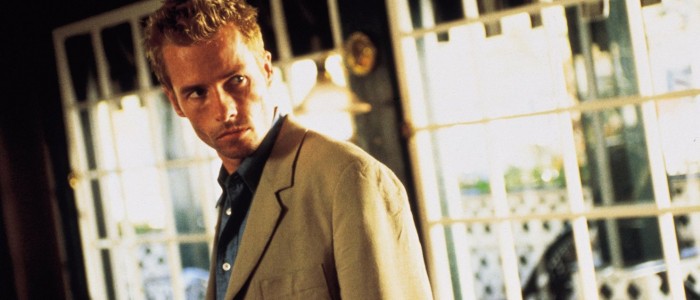 Christopher Nolan's best movie is still one of his earliest. Memento is so tight and methodical down to the tiniest detail – it's like watching a master clockmaker at work. Starring Guy Pearce as Leonard, a vengeful amnesiac hunting down the man who raped and killed his wife, Memento is absolutely riveting as both a neo-noir and a character study on the drive for revenge. The two alternating timelines, one going forward, one going backwards, plays into Leonard's jumbled perceptions and his struggle to differentiate truth from reality. It's a mind-bending and gripping film that proves that Nolan works best on a smaller scale, when the his lofty ideas aren't weighed down by blockbuster budgets.
Christopher Nolan's best movie is still one of his earliest. Memento is so tight and methodical down to the tiniest detail – it's like watching a master clockmaker at work. Starring Guy Pearce as Leonard, a vengeful amnesiac hunting down the man who raped and killed his wife, Memento is absolutely riveting as both a neo-noir and a character study on the drive for revenge. The two alternating timelines, one going forward, one going backwards, plays into Leonard's jumbled perceptions and his struggle to differentiate truth from reality. It's a mind-bending and gripping film that proves that Nolan works best on a smaller scale, when the his lofty ideas aren't weighed down by blockbuster budgets.
2) Spirited Away
I can praise for hours the stunning animation in Hayao Miyazaki's magnum opus, Spirited Away. I can laud the lovely coming-of-age story of the main character, the stubborn Chihiro. I can compliment the wealth of symbolism, the eye-opening depictions of Japanese spirituality, that breathtaking flying sequence.
But my favorite part of Spirited Away is perhaps its quietest and most mundane: the virtually silent four-minute scene — except for the melancholy score by Joe Hisaishi — in which Chihiro sits on a train, looking out at the flooded landscape and the crowd of faceless spirits walking in and out of each other's lives. It doesn't seem to have anything to do with the rest of the ostentatious plot — in fact, it could easily be plucked out and you wouldn't notice. But to me, it's the heart of Spirited Away and its musings on youth, loss of innocence, and life and death. It also embodies to me what animation has lost nowadays: the ability to stop, take a breath, and just let the story play out.
1) Eternal Sunshine of the Spotless Mind
There's no better movie for me than a good love story, except for perhaps, a sad love story. And not a sad story torn apart by tragedy, or cancer, or Nicholas Sparks — sad story in which the biggest obstacle is reality. Eternal Sunshine of the Spotless Mind, for all of its bold visual flairs, time-warping narrative structure and fantastic performances by Jim Carrey and Kate Winslet, is at its heart, a sincere and bittersweet love story — one in which our two main characters, Joel and Clementine, find themselves repeating the same mistakes over and over again, for love. But despite discovering the truth of their wiped memories and their scattered romance, they would do it again, every time. It's so sad, and real, and human.

